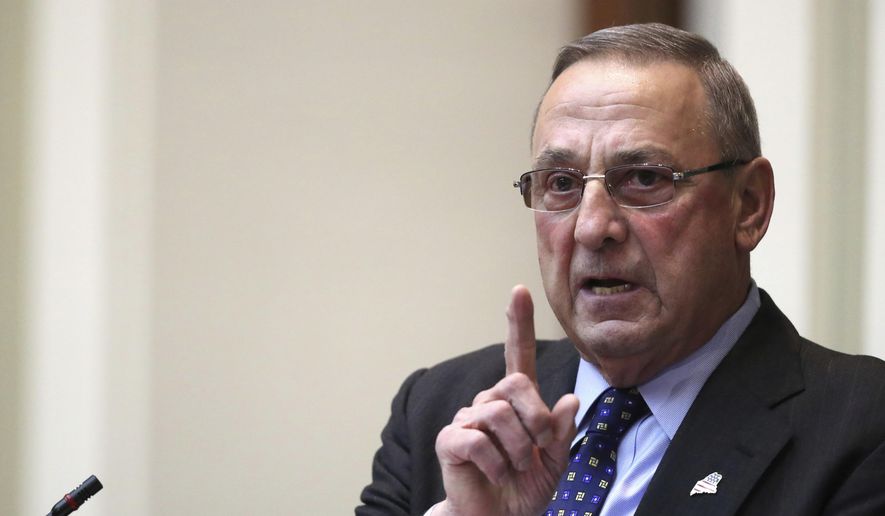AUGUSTA, Maine (AP) - Maine’s Republican governor, who ran away from home as a child and rose to be a businessman and conservative fiscal leader, said Tuesday night that the American dream is still possible even in a state with a lagging economy and a rapidly aging population.
In his annual State of the State address, Gov. Paul LePage vowed to keep fighting for the corporate and income tax cuts and broadening of the sales tax that legislators have rejected in previous years.
Liberals in southern Maine, the governor said, don’t see the poverty in Calais, Machias, Rumford or Fort Kent, and instead support tax hikes that chase the rich outside of Maine.
“Successful people are not the problem, they are the solution,” LePage said. “They create jobs.”
LePage said he imagines a Maine with no income tax, $29-an-hour career wages, low energy costs and zero-interest student loans for those who live and work in the state. But, he said: “There’s no political will here in Augusta to strive for that prosperity.”
The governor was at times combative - repeatedly bashing liberals - while also asking lawmakers to work with him during his final two years as governor. He even invited them all to the Blaine House afterward.
It was a far different attitude compared to a year ago, when he snubbed lawmakers by skipping the formal address to a joint session of the Legislature after Democrats tried unsuccessfully to impeach him.
LePage’s address this year focused on his final two-year budget proposal - a $6.8 billion conservative wish list - and the governor’s desire for lawmakers to “do no harm” to the economy and the vulnerable.
He railed against “liberals” for hijacking the state’s ballot initiative process and Democratic lawmakers for not supporting his past efforts.
But he also asked lawmakers to work with him and noted that he’s made amends with a former enemy, Senate Democratic leader Troy Jackson, whom LePage once described as having a “black heart.”
Afterward, Jackson said he doesn’t want “pettiness” to prevent them from reaching common ground on issues like the opioid crisis. But he added that he wished LePage would talk less about trickle-down economics and more about directly helping the loggers of Aroostook County who feel they have no opportunities in Maine.
Democratic House Speaker Sara Gideon said she welcomes LePage working with legislators as long as he’s willing to. But she said “everyday Mainers” need a more transformative vision beyond LePage’s “do no harm” - one that also addresses college affordability and property tax relief.
A Mainer earning $60,000 a year would get $8 back under LePage’s proposed tax cuts, according to Gideon, compared with $14,000 for individuals who make $500,000.
The governor hit on points he has stressed in recent months, including his desire to create a flat income tax rate of 5.75 percent by 2020 and to protect the elderly from the economic harm caused by approved ballot initiatives whose consequences he claims voters didn’t understand.
People who have lost faith in their government, said LePage, voted for ballot questions that could endanger the signs of progress he said has been achieved by his administration: a bigger rainy day fund, income tax cuts, paid-off hospital debt and increasing state revenues.
Voters approved a minimum wage hike and a 3-percent surtax on the state’s highest earners last fall. The new surtax makes Maine have one of the highest tax rates on top earners in the country, while the minimum wage hike takes away an employer’s ability to pay certain tipped workers less than minimum wage.
“Liberals always want to aim low,” LePage said, calling for a focus on “career wages” of $29 an hour, rather than $9 an hour.
The governor also wants to cut welfare programs, and said the proposal is in line with his administration’s focus on the elderly and disabled rather than “able-bodied” adults. He said more than seven Mainers die each week from heroin, and that his administration is funding treatment to help addicts.
About 358,000 Mainers live on an average $1,130 monthly Social Security check, according to LePage. “Higher prices will push our elderly deeper and deeper into poverty,” he said.




Please read our comment policy before commenting.